All about brick hearths
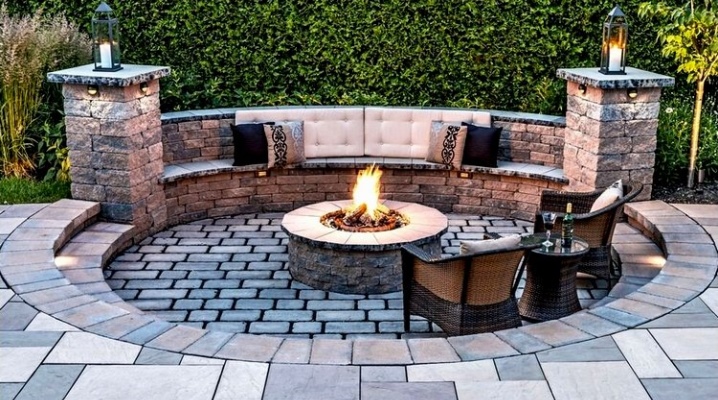
The hearth, as a rule, is equipped in a garden or summer cottage in order not only to designate a fireplace - a place where fire is often made, but to make this place noticeable, turn it into another semantic center of its developed territory. This article will focus on hearths made from one of the most affordable materials - brick.
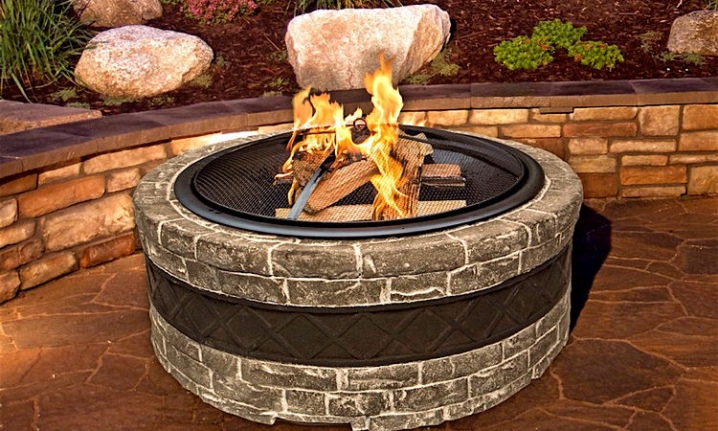
Peculiarities
A simple fire in the country, of course, is also possible. Several basic needs can form the basis of his organization:
- garbage disposal;
- cooking food;
- spending time in pleasant communication.
Sometimes all of this can happen at the same time. For example, baking potatoes in coals left over from burning tree branches.
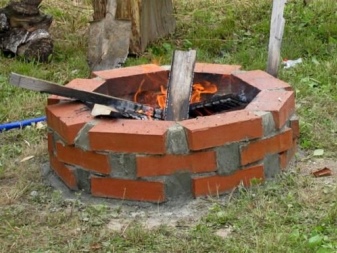
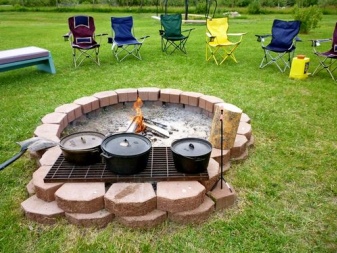
But such a spontaneous fire has serious drawbacks, in addition to dubious aesthetics, it also has an increased fire hazard. It is she who pushes many lovers of open fire to equip a brick street fireplace. It differs from a simple fire in its stationarity. This leads, even if it was not originally planned, to the zoning of the adjacent territory. Near the hearth, one way or another, there are benches or even chairs, a place for storing fuel, and, ultimately, a tabletop.
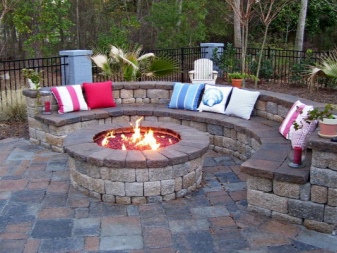
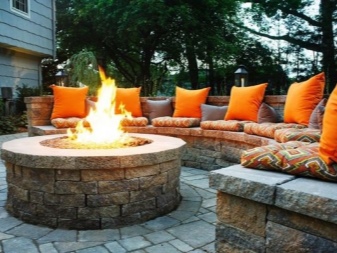
On such a hearth, you can place a grill for a barbecue, all kinds of devices for hanging a boiler or for a cauldron.
Often, when conceiving a hearth on their site, they proceed precisely from its importance for the formation of a common resting place outside the house. In this case, the organization of the space is thoughtful.
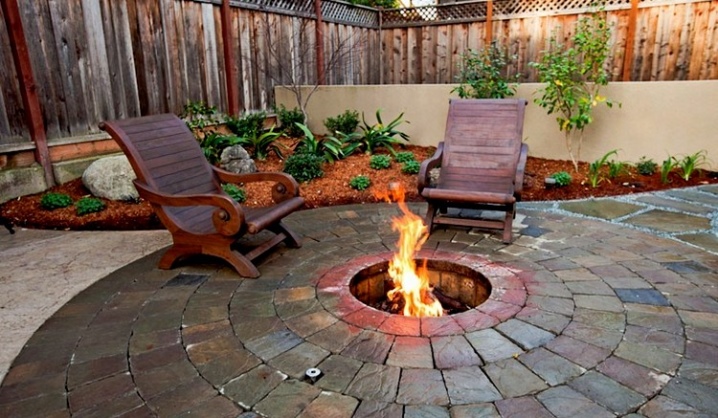
What are they?
There are different ways to classify brick fires.
They may vary in shape. There are few options:
- square;
- rectangular;
- round.
The simplest outdoor garden hearth is square.
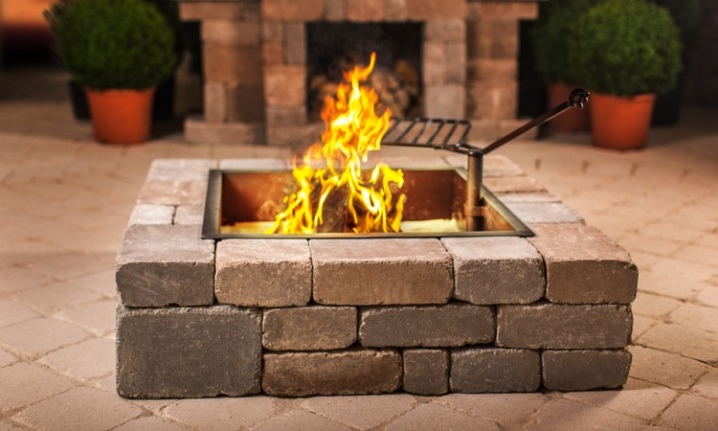
Even a master who does not have much experience in working with bricks can lay out a structure of this shape. It is advisable to maintain the inner dimension - at least 40 cm in diameter. Alternatively, a rectangular hearth. It is distinguished from a square one only by the difference in the ratio of length and width.
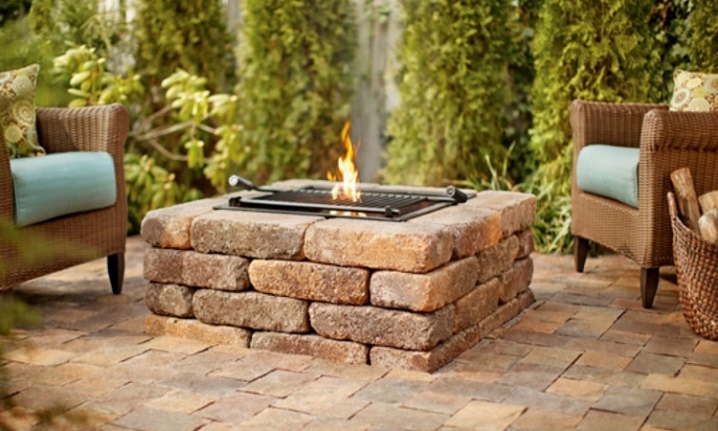
This form can be in demand if the hearth is used on the street, for example, for making a barbecue. There will be enough space for both skewers and charcoal preparation.
The most difficult to execute is a round hearth. Starting to make it, you will have to draw a certain template on the ground and lay out the entire structure on it.
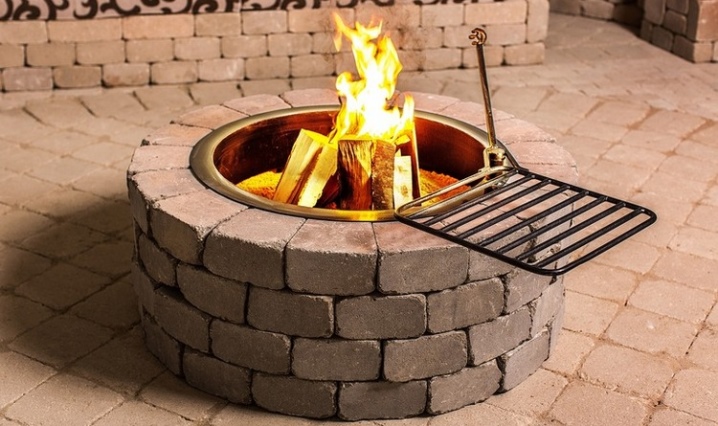
In this case, bricks can be located both vertically and horizontally. In the simplest version, they are not even fastened with a solution, but are stacked in a circle, either strictly vertically, or with a slope outward, forming a bowl.
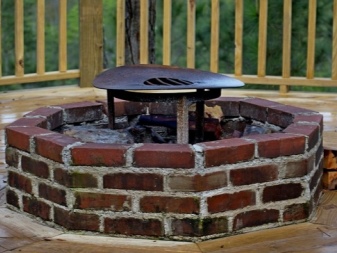
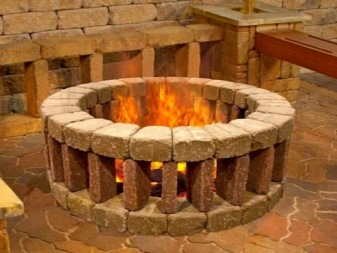
The foci can be different in depth. There are only two options: on the ground or in the ground.
In the first case, the hearth will have to be laid out above ground level. In the second, as it is not difficult to guess, before erecting a brick structure, you will have to dig a hole of one form or another and perform all the manipulations in it. Which option is better, it will not be possible to answer unequivocally. It is much more convenient to cook something on the hearth above ground level; it is possible to arrange a blower in it, thanks to which it will be possible to regulate the combustion.
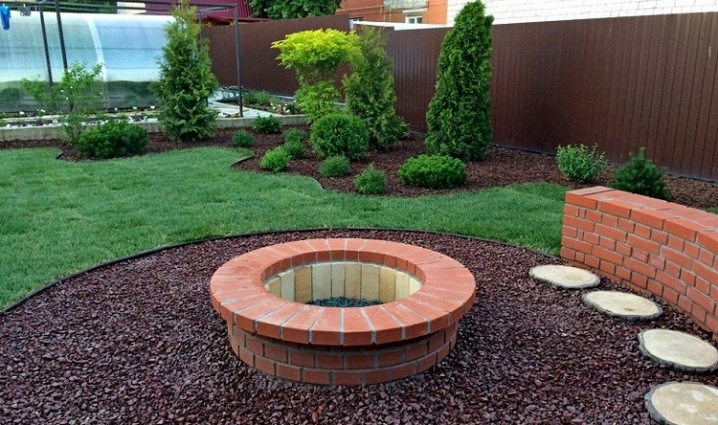
The hearth in the ground seems less convenient, but at the same time it is less fire hazardous. Sparks and especially quail do not fly out of it so much at a time when the fire is not burning. But even in this case, the upper part of the masonry should be slightly above the surface of the site.
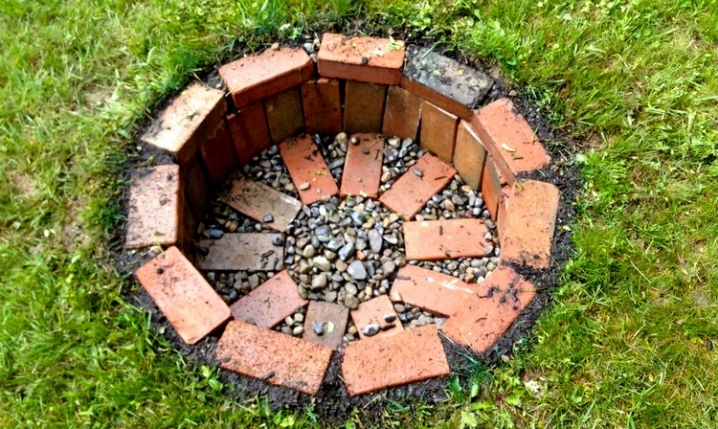
Open brick hearths can be classified by material.
Most often, such structures are made of red brick. This material is usually the most readily available. Silicate brick foci are much less common. For open fire, it can be considered the least suitable. Often, heating can lead to cracking of white bricks, although it is quite suitable for a temporary hearth. The best option is refractory bricks.
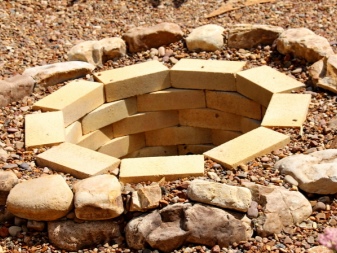
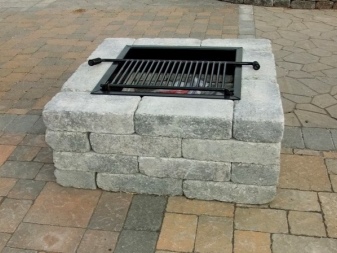
Unlike red, it does not transfer heat, and the surface of the hearth will always remain cold. Also, it does not crack, like silicate brick, which prolongs the operating time of such a structure. True, it costs more, and it is much more difficult to find this material.
How to do it yourself?
Creating a regular brick fire pit at a summer cottage with some skills is not so difficult.
Seat selection
As a rule, it is not difficult to find a place for a hearth on a long-developed area. Usually such a place already exists, all that remains is to equip it. A simple red brick hearth will significantly ennoble the space.

It is important to remember that there must be at least 3 meters to the nearest buildings; it is also undesirable to start a fire less than 1.5 meters from trees and bushes. It is necessary to try to take into account the location of neighboring areas and the prevailing direction of the winds, although with a small area of \ u200b \ u200bthe territory it is unlikely that it will be possible to completely exclude the spread of smoke.
On a new site, it is better to plan a place for the hearth in advance; a large-scale plot of the site is useful for this. So it will be possible to optimally organize the territory, taking into account most of the factors: wind, relief, placement of buildings and vegetation.
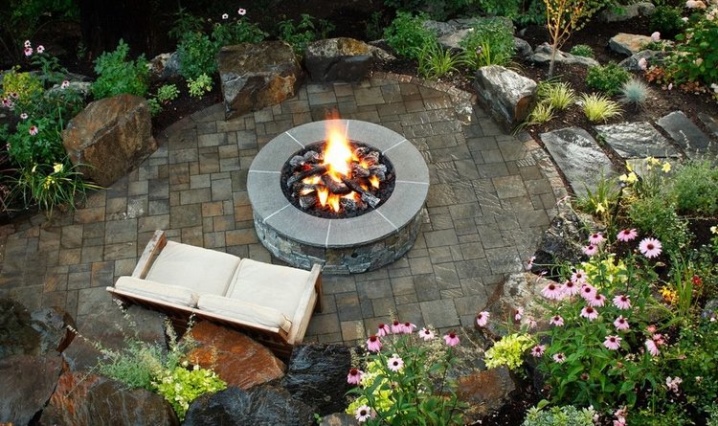
If the surface of the site is uneven, this will add a number of restrictions. You should not place the campfire zone in the highest place, most likely, there will be the strongest winds there. This will not only make it unpleasant to spend time by the fire, but it can also cause sparks to fly violently.
A bonfire in a low place can fill with water during rains or melting snow. Even if you make good drainage, moisture will stay around the hearth for a long time and it will also be difficult to stay there.
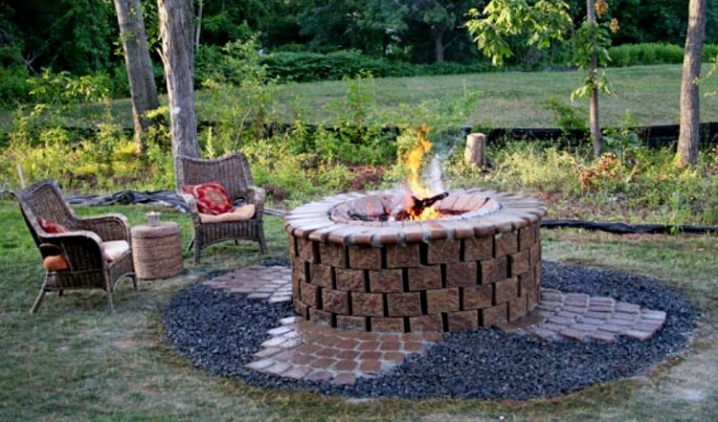
Often, a brick hearth is placed in the yard, this is especially justified when the yard is covered with rubble, limestone, paving slabs or all the same brick. In this case, it is also necessary to take into account the location of the buildings, trying to maintain optimal distances. The fire pit in the courtyard will definitely be the most protected from air currents. It is important that it does not become an obstacle to moving around the yard.
Laying steps
Before you start laying bricks, you need to decide on the location, shape and material. For this, the simplest drawings of the planned object will come in handy. A simple contour on the ground may not be enough.
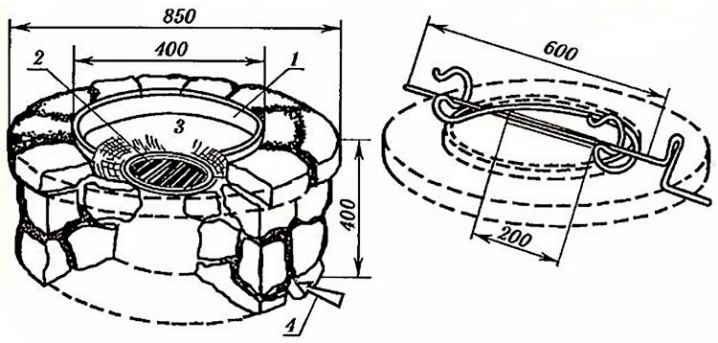
The brick has strictly specified dimensions and, when constructing something from it, one must proceed from this. It is important to remember that there are several standards for making bricks, and it is better to prepare the material of the same size.
Having decided on the shape, you need to at least roughly estimate the amount of material. It is also important to prepare the ingredients for the future solution. If it is a clay-based solution, as used by stove-makers, the hearth will have to be somehow closed from the effects of precipitation.
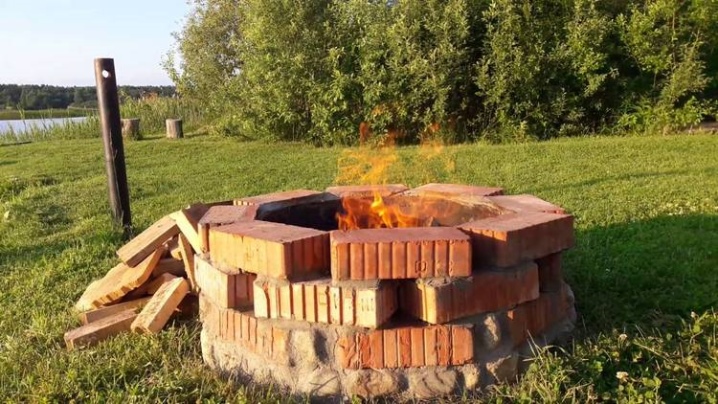
If it is a cement mixture, it is necessary to take into account its reaction to temperature changes. For masonry inside the hearth, a cement mortar with fireclay chips, which has refractory properties, is suitable. For exterior finishing work, this solution is not suitable, and you will have to prepare the usual cement-sand mixture.
If the place for the future hearth is determined, the choice is justified and there is no doubt, you can start working.
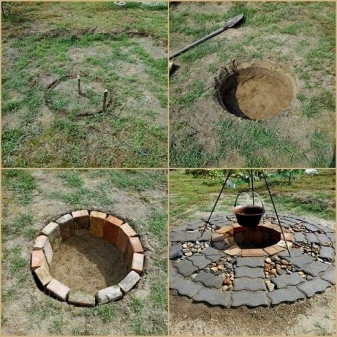
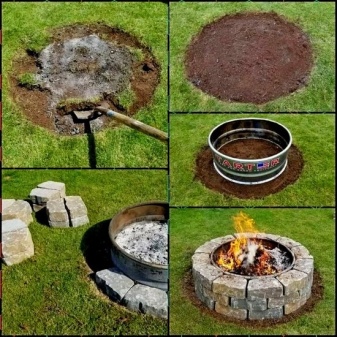
Step-by-step instructions for making a brick fire site will help in performing the work.
- According to the drawing, you need to prepare a place for the future hearth, for this it is necessary to outline its outline on the ground.
- If the structure is in the ground, it is necessary to dig a hole at the designated place. The size of the pit should be slightly larger than the estimated size of the hearth.
- Even if the hearth is on the ground, this point cannot be avoided, although the depth of the pit may be less.
- It is better to strengthen the bottom of the pit with rubble, this is especially important if the soil is sandy. The thickness of the crushed stone layer should be at least 10 cm. If you ignore this stage, you can witness the destruction of the structure in two or three seasons due to the flooding of its base.
- Next, you need to lay out the shape of the future hearth in accordance with the drawing, in which the amendments that appeared during the work can be made.
- If the hearth is in the ground, the quality of the masonry is not so important; the walls can be folded even from old bricks. But if the fire pit has to rise above the general level of the ground, all the flaws will be very noticeable, and in this case the masonry will be of great importance.
- If the inner row is made of fireclay refractory bricks, a special mortar will be needed for masonry.
- If there is a metal or concrete bowl, it can be laid inside, and outside it can be clad with decorative bricks.
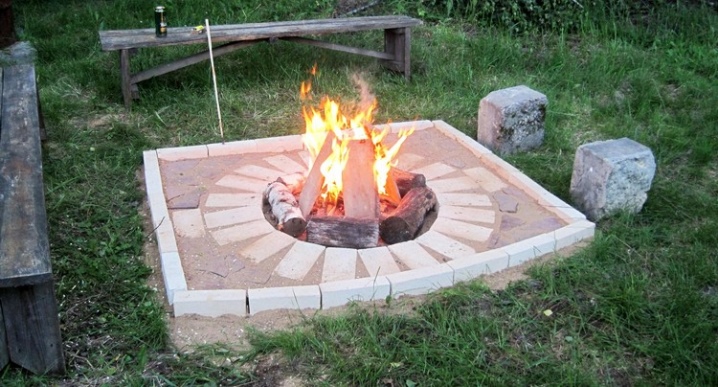
It is important to take into account that a brick fire pit, if it is made according to all the rules, the object is stationary, and after its installation, the transfer of the finished structure is impossible.
Watch a video on the topic.































































The comment was sent successfully.